The Labor of the Sun and the Song of the Breeze: A Greek Fable
Reading Time: 14 min
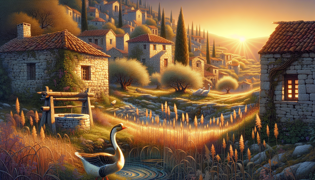
About Story: The Labor of the Sun and the Song of the Breeze: A Greek Fable is a Fable from greece set in the Ancient. This Descriptive tale explores themes of Perseverance and is suitable for All Ages. It offers Moral insights. A timeless Greek fable where diligence and vision outlast fleeting pleasures.
Introduction
In the heart of ancient Greece, beneath an endless expanse of azure skies and kissed by the gentle caress of the Aegean breeze, there lay a village whose spirit was as ancient as the gods themselves. The sun, a steadfast patron, illuminated olive groves and vineyards spread like generous blessings across the hillsides. Amid this timeless landscape, rustic stone cottages and crowded market squares echoed with tales of old, where myth and morality intertwined in every whispered legend.
It was during the golden days of summer when the earth pulsed with life and color that our story begins—a story of two very different creatures whose paths would forever be intertwined. In the tender shadow of a venerable olive tree stood an ant of unassuming size, its delicate legs moving with purpose and precision as it gathered morsels of sustenance. With every measured step, it carried echoes of its ancestors’ labors, dutifully preserving the fruits of summer for the inevitable embrace of winter. The air was thick with the scent of ripening figs and the soft melody of the lyre from nearby hearths, weaving a tapestry of anticipation and quiet determination.
Yet, not far from this scene of dutiful industry danced a grasshopper, whose carefree heart sang with the exuberance of youth. He leapt from stone to sunlit stone, his laughter mingling with the rustling leaves, his every note a hymn to life’s ephemeral pleasures. In his eyes sparkled a freedom that defied the passing of time, even as the cool whisper of the wind gently urged him to seek refuge for the coming chill. Their divergent lives, bound by the same radiant season, set the stage for a tale as old as nature—one that would explore the delicate balance between revelry and responsibility, between the fleeting moments of passion and the enduring strength of foresight.
The Summer's Lilt: A World in Bloom
As the days stretched luxuriously under the benevolent gaze of the Greek sun, the village stirred with the symphony of life. The gentle hum of bees in fragrant groves of thyme and lavender filled the air, while market vendors arranged vibrant arrays of produce on stone tables, their voices rising in song-like haggling that resonated with the pulse of ancient traditions. In one corner of a sunlit courtyard, the ant appeared as a beacon of unwavering purpose. Its tiny frame moved with rhythmic calculation along a narrow pathway lined with pebbles smoothed by centuries of footsteps, gathering grains and seeds with a sense of duty instilled by the wisdom of its forebears.
The ant’s world was one of discipline and method—a counterpoint to the jubilant chaos of the season. Its every movement echoed the legacy of those who labored in silence and steadfastness. As it trudged from one olive grove to the next, the ant was watched by many an observant soul. Among these was an elder storyteller, whose gnarled hands and wrinkled face betrayed a life woven with both joy and sorrow. He had seen many a season pass, each one a chapter in the eternal narrative of life, and his eyes shone with a quiet understanding when witnessing such relentless industry.
In stark contrast, a vibrant figure flitted about the meadows—a grasshopper whose spirited song echoed through the air like the delicate strains of an Aegean lyre. The grasshopper’s movements were reminiscent of a dancer in a festival, free and unconstrained by the burdens of time or duty. With every nimble leap over sun-warmed stones, it celebrated the moment, its carefree tunes a rebuttal to the stern call of responsibility. The grasshopper’s garb, a splash of verdant greens and earthen browns, mimicked the surrounding foliage, and its eyes sparkled with the audacity of those who believe that each day is made solely for revelry.
No sooner had these two figures embarked on their divergent quests than the signs of impending change began to stir. Gentle whispers of cooling winds and the subtle shift in the air hinted at mysteries far beyond the bright and fertile days of summer. The ant continued its ceaseless journey with a meticulous grace, each step a testament to its inherited devotion. Meanwhile, the grasshopper’s tunes grew even more lilting, a delicate interplay of joy and a latent undercurrent of ignorance to the coming turn of fate. The duality of their existence—one of earnest preparation and the other of ephemeral delight—set into motion a clash of philosophies that had been as eternal as the sea and the sky.
In the warm embrace of summer’s lilt, the village became a living canvas where nature, heritage, and human endeavor danced together in intricate patterns. The diligent ant and the carefree grasshopper, each representing the two vital threads of existence, moved within a world that thrived on balance, even as destiny hinted that the scales would soon tip in favor of hard-earned lessons over idle mirth.
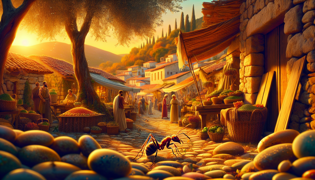
The Harsh Summer Trials: When Radiance Shadows Responsibility
As the midsummer heat matured, the golden days began to exhibit an undercurrent of both abundance and warning. The village, once a picture of untroubled splendor, started to reveal the first hints of strain. The olive trees, bathed in a relentless glare, began to lose a fraction of their lush green leaves, and the fruits on the vines, though heavy and ripe, demanded a careful harvest before the seasonal shift. In this simmering crucible of abundance and impending scarcity, the ant's unwavering labor became more pronounced, a sturdy beacon amid the vexations of a temperamental summer.
In the midst of this fervor, the wise elder sat in quiet contemplation outside the stone agora. His gaze, deep as the ancient well of time, fell upon the ant scurrying along a narrow terrace between clustered dwellings. He saw in the ant's expression a mix of resolute focus and humble acceptance. Every tiny morsel it gathered was not merely sustenance but a pledge to survival when the warmth of summer would surrender to the bleakness of winter. The elder, burdened by years but still spirited by tales of old, murmured softly about the virtues of perseverance and the bitter consequences of neglecting future needs.
Conversely, the grasshopper, sensing the shift yet unwilling to be tethered by the encroachments of forethought, plunged deeper into the realms of unfettered jubilation. It traversed the sun-scorched meadows with a heart full of melody and a spirit unburdened by worry. Along with its compatriots, the grasshoppers performed impromptu concerts, their chirps harmonizing into tunes that seemed to challenge the gathering clouds above. Their voices ringed out as an ode to the fleeting beauty of each moment, a reminder that life—despite its transient hardships—is best lived in celebration.
The clash was not one of overt confrontation but of quiet dichotomy. While the ant, with disciplined patience, built secret stores of granules in hidden crevices of earthen walls, the grasshopper reveled in the transient elation of its art. As the days wore on, the languorous heat pressed upon the village, intensifying the tension between ephemeral enjoyment and the relentless march of time. The fields began to show signs of fatigue; the shimmering mirages on distant horizons whispered of distant winters that had not yet lost their grip on memory.
A palpable weight seemed to settle over the cobbled streets and the open courtyards of the village. The ant's soulful dedication resonated in the subtle clack of tiny legs against stone, an aria of persistence that scarcely troubled the busy chatter of life. On the periphery, the grasshopper’s playful antics began to evoke a series of cautious looks and furrowed brows from passersby who understood, in the quiet depths of their experience, that the time for idle delight was numbered. Thus, under the relentless midsummer glare, every heart in the village risked being drawn into a larger parable—one that questioned whether beauty alone was enough to fend off the coming cycle of hardship.
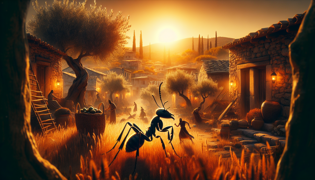
Whispers of the Inevitable: The Winter Beckons
Inevitably, the unyielding cycle of nature began to reclaim its dominion; the fervor of summer capitulated to the encroaching chill that signified the advent of winter. In the crisp, early days of fading warmth, whispers of frost crept among the remaining blossoms and the delicate dew shimmered like silver threads at dawn. The transformation of the landscape was subtle at first—a gentle cooling of the air, a slight droop in the exuberance of the flora—but soon it announced a profound metamorphosis.
In the heart of this transforming season, the village became a living allegory of preparation and consequence. The ant, now the personification of foresight and unwavering commitment, had long ago retreated to its concealed granaries. Every carefully stored seed and every morsel of nourishment, gathered during the nostalgic yet demanding days of summer, glistened like tiny embers in the dim light of approaching winter. The ant’s labor, performed with unerring rhythm, had become a testament to the notion that even in nature, survival is won by those who plan and persevere.
Contrasting sharply with this diligence, the grasshopper now found itself engulfed by a sudden, biting chill. The once effervescent notes of its mellifluous symphony had faded into a desperate refraining, as the reality of a harsh season left little room for frivolity. Having spent the days of plenty in unguarded merriment, the grasshopper’s heart sank upon realizing that the laughter that had danced through sunlit afternoons could not warm the frost-laden nights. Now, enveloped by solitude and regret, the grasshopper wandered near abandoned pathways, its once vibrant spirit muffled beneath a cloak of shivering remorse.
In quiet corners of the village, elders recounted stories of similar times, binding the narrative of nature’s ceaseless cycles with lessons etched in memory. They spoke of times when the balance between work and play was so fundamental that the flip of a coin could determine a family’s fate for generations. The grasshopper, too, had its admirers—those who lived for the moment and trusted fate to provide—but as the biting winds howled and the chill seeped into every crevice, the difference between a prepared mind and a heedless soul was laid starkly bare.
Every frozen gust of wind seemed to whisper the ant’s timeless truth: that triumph over winter, literal or metaphorical, is a reward for those who do not squander the substance of their days in idle pursuits. In this season of reckoning, the ant’s foresight was celebrated as an act of wisdom and resilience, while the grasshopper’s lament served as a somber reminder of the peril of unfettered hedonism. The natural world, in its immutable cycle, had become the silent adjudicator of a lesson that the heart of Greece would remember for centuries.
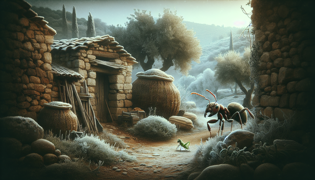
A Lesson Etched in Time: Redemption Through Reflection
As the days shortened and winter’s chill deepened, the village drew closer together in shared adversity. Inside sun-warmed homes that now glowed faintly by the light of oil lamps, families huddled near the hearth while murmurs of past summers and tales of hard-won wisdom filled the air. The once divergent lives of the ant and the grasshopper converged in a quiet moment of reckoning. In a modest courtyard flanked by weathered columns and draped in vines that clung defiantly to crumbling stone, the two unlikely figures met under a star-studded sky.
The ant, whose days had been consumed by tireless labor, regarded the grasshopper with a measured compassion. In its silent eyes, there shimmered not triumph, but a solemn knowledge of nature’s indispensably cyclical lessons. The grasshopper, worn and regretful, listened intently as the ant, with deliberate gestures and humble tones, recounted the importance of foresight. It spoke not with arrogance, but with a warmth that sought to redeem shared humanity. Through slow and careful discourse imbued with ancient parables and the weight of personal experience, the ant explained that hard work was not a punishment, but a means of ensuring that the beauty of summer could be relived in the warmth of future days.
The dialogue, soft as the whisper of the wind through olive branches, transcended mere words; it became a subtle dance of empathy and learning. The grasshopper's heart, once buoyed only by the fleeting thrill of spontaneity, began to understand that the seed of regret is often sown when one dismisses the wisdom of preparation. Under the vast tapestry of the starlit sky, with constellations that had guided sailors and philosophers alike, the two kindred souls exchanged gifts of insight. The ant revealed how every grain of food in its store was a small promise to a future self, a pact with destiny that ensured survival in the icy grip of winter.
For the grasshopper, the night unfolded like a quiet epiphany—a painful yet necessary catharsis. As it contemplated the loss of carefree hours, it also began to see a path toward redemption. The lesson was not entirely one of blame but of balance: acknowledging the need for joy while never discarding the responsibility of preparation. In this reflective exchange, the grasshopper’s melody shifted. No longer was it a song of careless abandon, but one that carried the tentative notes of hope and a determination to mend what had been neglected. Its eyes, wide with the realization of time’s swift passage, glistened with the humble resolve to learn from the ant’s enduring example.
In that serene and transformative night, both the ant and the grasshopper found a kind of mutual redemption—a promise that even when life’s seasons bring hardship, the wisdom of preparing for the inevitable can kindle the light of renewal. Their union, however brief, became a living parable in the hearts of the villagers, a story to be passed down as both a cautionary tale and a beacon of hope for future generations.
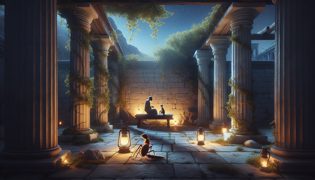
Conclusion
As dawn broke over the now silent village, the soft hues of a new day brought with it an air of reflective renewal. Winter, in its austere beauty, had not been unkind; rather, it served as a relentless teacher, guiding each soul towards a deeper understanding of life’s transient nature and the enduring value of preparation. In the quiet moments of morning, as the frost slowly yielded to a gentle sun and the first hints of green emerged bravely from the frozen earth, the legacy of the ant’s labor and the transformative journey of the grasshopper were etched indelibly into the collective memory of the community.
Villagers gathered around communal fires and in the warmth of shared meals to recount the tale of the two unlikely companions, whose lives had intersected to reveal an eternal truth: that passion and prudence are not opposing forces but complementary notes in the grand symphony of existence. The ant’s steadfast work had provided a bulwark against the inevitable hardships of life, while the grasshopper’s eventual awakening illuminated the path to redemption, underscoring the importance of adapting one’s ways in the face of nature’s unyielding cycles.
As the seasons turned once more and the olive groves whispered secrets with each shifting breeze, the story was passed from one generation to the next. It became a gentle reminder that while joy and spontaneous delight are treasures unto themselves, they find their fullest expression only when balanced with forethought and responsibility. In the enduring twilight of ancient Greece, where every stone and whisper bore the weight of history, the fable of the ant and the grasshopper stood as an everlasting beacon—a lesson etched in time, urging all who listened to harmonize the fleeting cadence of life with the enduring rhythm of work and preparation.
Thus, in the mists of ancient memory, the two lives intertwined, serving as living testaments to the simple, profound truth that wisdom blooms in the fertile soil of perseverance. The future, unpredictable and wild as the wind, now held a promise brightened by the lessons of the past—a promise that even the coldest winter would eventually yield to the warm embrace of a well-prepared spring.

















